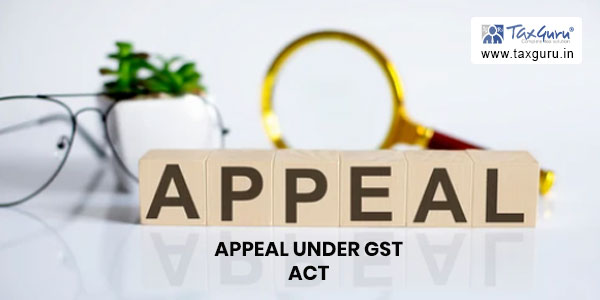ABSTRACT
Any party who feels aggrieved by a decision made in compliance with the CGST, SGST, or UTGST acts may appeal it under the terms of the GST Act to the relevant authority or High court. The maximum filing window is three months after the lower court’s ruling is announced. A quasi-judicial approach is used by the departmental officer to settle the dispute initially. Tax law acknowledges that there may be several perspectives or points of view on any given collection of facts and legislation. As a result, it is probable that the taxpayer will disagree with the “adjudication order” that the tax office has issued. In other instances, it is equally feasible for the Department to disagree with the adjudication order. Because of this, the Act gives both sides access to additional routes of appeal. Let’s understand the procedure for filing an appeal under the GST act with the help of this article.
Introduction to Appeal and Disputes
Any legal appeal is an attempt to have a lower court’s judgment overturned in a higher court. When there is any kind of legal obligation, appeals are made. On the other hand, Tax disputes are disagreements between the taxpayer (or the person who is responsible for deducting the taxes) and the tax administrator or his officer involving tax computation, payments or recovery, non-payment or overpaying of tax, and penalties for non-compliance with or breach of tax responsibilities.
LEVELS OF APPEAL
There are four stages of appeals, which are filed with various authorities in accordance with various acts.

TO THE ADJUDICATING AUTHORITY
Level 1 – In accordance with section 107 of the GST Act, you may appeal a decision made by the adjudicating authority to the first appellate authority.
TO THE APPELLATE AUTHORITY
Level 2 – In accordance with sections 109 and 110 of the GST Act, you may appeal a decision made by the First Appellate Authority to the Appellate Tribunal.
TO THE APPELLATE TRIBUNALS
Level 3 – In accordance with sections 111 to 116 of the GST Act, you may appeal a decision made by the Appellate Tribunal to the High Court.
TO THE HIGH COURT
Level 4 – In accordance with sections 117 and 118 of the GST Act, you may appeal a High Court order to the Supreme Court.
TO THE ADJUDICATING AUTHORITY
- The term “Adjudicating Authority” is defined under the Act as the authority that has the power to issue any order or judgement under the GST Act, including decisions on GST appeals.
- The 1st Appellate Authority and the Tribunals are still excluded from the board. Any judgement or order made in compliance with the Act is therefore an act of “adjudication” authority.
- Examples include: – the decision to deny a request for a refund; the decision to terminate registration; the application of a penalty; and the use of best judgement in making an evaluation.
TO THE APPELLATE AUTHORITY
- To file any appeals under the GST, the taxpayer has three months from the day the GST Officer notified the ruling.
- A place of supply case may also be appealed
- Pre-deposit information: admitted tax, interest, fees, and 10% of the amount in dispute.
PAYMENT FOR APPEAL The maximum deposit is restricted to INR twenty-five crores.
- Within a year after the appeal date, the order should be passed.
- In addition, if the party that was wronged is dissatisfied with the decision made by the appellate authority, they may appeal to the appellate tribunal.
- The GST appeal form number is APLO1.
TO THE APPELLATE TRIBUNAL
- To file any appeals under the GST, the taxpayer has three months from the day the GST Officer notified the ruling
- In case of place of supply, appeal can be made to the National and Regional Bench.
- Pre-deposit information: admitted tax, interest, fees, and 20% of the amount in dispute.
PAYMENT FOR APPEAL The maximum deposit is restricted to INR fifty crores.
- Within a year after the appeal date, the order should be passed.
- In addition, if the party that was wronged is dissatisfied with the decision made by the appellate tribunal, they may appeal to the High Court.
- The GST appeal form number is APL-O5.
Within seven days of filing the application, according to sub-rule (1), a paper form of the application in Prescribed Form APL-07 must be submitted to the Registrar in quintuplicate as well as a certified copy of the decision or order. appealed against and relevant documentation. The Registrar would then issue an appeal number.
TO THE HIGH COURT
- Taxpayers have the right to challenge a court order. If the High Court believes the matter presents a serious point of law, it may grant the appeal. However, if the ruling is upheld by the National or Regional Benches, the person may be allowed to seek an appeal with the High Court.
- To file an appeal with the High Court, an appeal memorandum must be filed within 180 days after receiving the order appealed against, accompanied by the necessary fee, specifying clearly the serious issue of law involved.
- Taxpayers may also file an appeal with the Supreme Court in the event of a judgement or decision issued by the National Bench, Regional Benches of the Appellate Tribunal, or High Court.
WHAT ARE THE GROUNDS FOR FILING AN APPEAL UNDER THIS ACT?
- If an aggrieved party is dissatisfied with any facts, observations, or conclusions stated by the authority issuing the order, they may file an appeal. It is the most crucial aspect of the attraction. Grounds of appeal in GST are factors that demonstrate the nature of the disagreement between the assessee and the revenue. The basis of the appeal is the essence of a claim, hence it differentiates from arguments as the arguments are stated in favour of a claim. There may be multiple reasons in favour of a claim, but all of them cannot constitute grounds for filing an appeal.
WHEN APPEALS CAN NOT BE FILED
- On the decision of the Council, the Board or the State Government may establish monetary limitations for GST officer appeals in order to manage the filing of appeals and minimize excessive litigation expenditure. Can all judgements be challenged? No. Appeals are not permitted for the following GST officer decisions:
- An order transferring the hearings from one officer to another;
- An order to confiscate or preserve accounting books as well as other documentation.
- An order authorizing trial under the Act;
- or an order authorizing tax deductions and other payments in instalments.
HOW TO FILE AN APPEAL MANUALLY
To submit an appeal against a demand order, follow these steps:
1. Navigate to www.gst.gov.in. The GST Home page appears.
2. Access the GST Portal using proper credentials, such as your Login Id and Passwords.
- Making an Appellate Authority Appeal
- Attach Annexure to GST APL-01.
- Disputed Amount/Payment Information
- Pre-deposit percentage of the challenged tax
- Make use of cash/ITC
- Include any additional supporting documentation.
- Review the Application and File it.
REFERENCES:
- https://www.cbic.gov.in/resources//htdocscbec/gst/51_GST_Flyer_Chapter50.pdf
- https://cbic-gst.gov.in/aces/Documents/appeal-rules.pdf
- https://tutorial.gst.gov.in/userguide/appeal/appeal_manual.htm
AUTHOR – KIRAN, STUDENT AT THE SCHOOL OF LAW, CHANDIGARH UNIVERSITY






Appreciate your hardwork behind this article .This helps me alot in filling an appeal .
a penalty has been levied for non document with while good transfer from one godown to another.whether appal can be sustained?
CAN ASSESSEE FILE APPEAL UNDER GST ACT AFTER EXPIRY OF THREE AND ONE MONTH IF YES THEN TELL PROCEDURE
THERE IS EXPIRY OF THREE AND ONE MONTH CAN ASSESSEE FILE APPEAL IN GST
Written in a simple yet informative format. Great work
Such a precise and relevant critique written by you.
Great article written by you kiran on GST .Appreciate your hardwork behind this article .This helps me alot in filling an appeal .